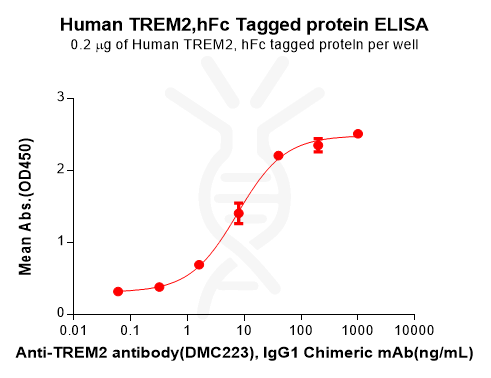| TARGET | |
|---|---|
| SYNONYMS |
PLOSL2;TREM-2;Trem2a;Trem2b;Trem2c |
| DESCRIPTION |
Recombinant Human TREM2 with C-terminal human Fc tag |
| DELIVERY |
In Stock |
| UNIPROT ID |
Q9NZC2 |
| EXPRESSION HOST |
HEK293 |
| TAG |
C-Human Fc Tag |
| MOLECULAR CHARACTERIZATION |
TREM2(His19-Ser174) hFc(Glu99-Ala330) |
| MOLECULAR WEIGHT |
The protein has a predicted molecular mass of 43.6 kDa after removal of the signal peptide. The apparent molecular mass of TREM2-hFc is approximately 35-55 kDa due to glycosylation. |
| PURITY |
The purity of the protein is greater than 95% as determined by SDS-PAGE and Coomassie blue staining. |
| FORMULATION & RECONSTITUTION |
Lyophilized from sterile PBS, pH 7.4. Normally 5 % – 8% trehalose is added as protectants before lyophilization. Please see Certificate of Analysis for specific instructions of reconstitution. |
| STORAGE & SHIPPING |
Store at -20°C to -80°C for 12 months in lyophilized form. After reconstitution, if not intended for use within a month, aliquot and store at -80°C (Avoid repeated freezing and thawing). Lyophilized proteins are shipped at ambient temperature. |
| BACKGROUND |
This gene encodes a membrane protein that forms a receptor signaling complex with the TYRO protein tyrosine kinase binding protein. The encoded protein functions in immune response and may be involved in chronic inflammation by triggering the production of constitutive inflammatory cytokines. Defects in this gene are a cause of polycystic lipomembranous osteodysplasia with sclerosing leukoencephalopathy (PLOSL). Alternative splicing results in multiple transcript variants encoding different isoforms. [provided by RefSeq, Nov 2012] |
| USAGE |
Research use only |
1
/
의
1
Dima Biotech
SKU(재고 관리 코드):PME100633
Human TREM2 Protein, hFc Tag
Human TREM2 Protein, hFc Tag
PRODUCT DATA
IMAGES

Figure 1. Human TREM2 Protein, hFc Tag on SDS-PAGE under reducing condition.
Figure 2. ELISA plate pre-coated by 2 μg/mL (100 μL/well) Human TREM2 Protein, hFc Tag(PME100633) can bind Anti-TREM2 antibody(DMC223), IgG1 Chimeric mAb in a linear range of 1.60–40 ng/mL.
Share


